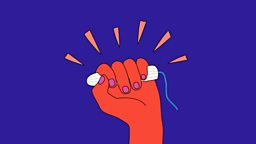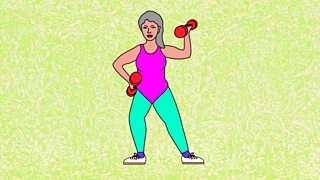Can you harness the power of your period?
As it becomes more and more acceptable to talk about our periods out in the open, books and apps are encouraging us to track our menstrual cycle - not just for contraception, but to help us harness ‘the power of our periods’. But where’s the evidence that knowledge will bring power? Dr Emma Ross, head of physiology at the English Institute of Sport, and Maisie Hill, the author of Period Power, tell ÃÛÑ¿´«Ã½ Radio 4’s Woman’s Hour why getting to know your own cycle can put you, rather than your hormones, in control…

Maisie Hill - author of Period Power
It's really important when understanding your menstrual cycle to track your cycle and get to know your experience, not just so you can plan for the days that are a bit harder, but so that you can make the most of your talents when you are feeling great and like you are ‘the best version of yourself’.

The focus in the media tends to be on the negative experience of the menstrual cycle. It's really key to know that the hormones have an impact on your energy, mood and your behaviour, but they can actually really influence you in a very positive way.
For instance, I’m day 10 in my cycle, I've got Oestrogen about to peak, I'm pre-ovulation, I'm feeling great - this has been a great day for public speaking! But that doesn't mean that if you got in contact with me and asked me to come in on day 20, when I like peace and quiet and I'd rather be at home on the sofa, that I wouldn't have been able to do it. I would have just been more considered in my approach. The thing is understanding that the hormones of the cycle are there to serve you and to act in your favour - they're not going to limit you unless you let them.
Think of your cycle like the seasons - and prepare for stormy weather
The four seasons approach - pioneered by Alexandra Pope and Sjanie Hugo Wurlitzer - is a really great way of understanding the cycle because it puts it into a common language.
In the same way as right now we're experiencing such horrific weather in the UK, you could describe your cycle in the same way; so in your winter, the time of menstruation when you're bleeding, you may be more inclined to want to stay indoors, hibernate a bit, prioritise your own needs rather than being out there in the world serving others which we are often doing. Whereas in the summer you are more extroverted, more likely to want to be outside being social. Hormones are very low at the start of the cycle and then they peak mid-cycle around ovulation. Everyone’s experience will vary and it's about your levels of hormones, your response to those hormones and the context of your life.
When you are tracking your cycle, it's a bit like looking at the weather forecast in advance. If you know tomorrow's going to be a bit of a rotter weather wise, then there might be times when you can just cancel your plans and stay indoors, but more often than not you've just got to put on a raincoat and get on with your day. And that's what knowing your experience of your cycle equips you to do.
Dr Emma Ross - Head of physiology at the English Institute of Sport
For a long time in sport we've treated female athletes like ‘little men’. We've used things that have worked in male athletes and just transposed them onto training and support in females, and that seems to ignore the fact that the biology of these two individuals are completely different. You're ignoring this massive opportunity to tap into the potential of understanding your hormones and utilising them.
Understanding your own experience of the cycle is hugely useful. So we get our athletes to track their symptoms; where they are in their cycle, how they are feeling physically and emotionally, either good or bad, it might be through their phone or it might be on a calendar, whatever's useful to them. We've done some research that shows that the levels of hormones in our system can vary greatly between us and our sensitivity to them is different. Some people before their period will feel emotional and lethargic and anxious and others will feel vivacious and energetic and enthusiastic.
It’s not acceptable to me that an athlete would get to the biggest event of their life, like the Olympic Games, and be put out of her event by debilitating symptoms. You don't train for it to be potluck what day your Olympic final is. What we're working on at the English Institute of sport is to really reframe the menstrual cycle and say that on any day of your menstrual cycle, you can be the best version of yourself - not that there are times in your cycle that you can't. That just doesn’t work.
If it’s your period on ‘race day’ - all is not lost
We often say that what separates elite athletes on the starting line of the Olympic final - they've all probably got the same physical preparation, they've all worked hard to get there - the defining point is their head, is their psychology. That's why they work with psychologists, but when you layer on top of that these hormones that fluctuate through your menstrual cycle and their effect on your brain, it's massively important to factor that in and the only way you can do that is to know yourself. To know that ‘my anxieties increase at this time’, so then there are ways and strategies to help you deal with that, because there are ways and strategies to deal with anxiety. But if you don't know when they are coming or you don't know that they are related to your cycle, you have absolutely no power to do anything about them, if it's a big day for you as an athlete or just as a woman performing in life.
A lot of the time we're not performing, we're preparing to perform, so we're either practicing or preparing for work, or a presentation, or training for a race. If for all those days we can optimise our performance and tap into what our cycle is telling us then whether our event lands on a ‘good’ or a ‘bad’ day, our training and preparation has been so much better because we've tapped into it. For example, there are parts of the cycle where you can sleep better. Well then go to bed early and use the powers that your cycle is giving you to fall asleep more quickly and sleep more deeply. That's about harnessing your cycle to help you recover better so when you do get to your event, you're better trained, you're better prepared. So 100% we need to consider the emotional and psychological effects of our cycle and arm ourselves with strategies, but also tap into when those hormones are giving us superpowers.
You can catch up with every episode of Woman’s Hour on ÃÛÑ¿´«Ã½ Sounds. You'll also find and .




